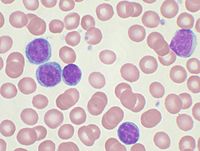
Photo from wikipedia
Chronic lymphocytic leukemia (CLL) is the most common leukemia in adults. Most individuals diagnosed with CLL will not need treatment immediately but over time the clonal B cells infiltrate the… Click to show full abstract
Chronic lymphocytic leukemia (CLL) is the most common leukemia in adults. Most individuals diagnosed with CLL will not need treatment immediately but over time the clonal B cells infiltrate the bone marrow, lymph nodes, liver, and spleen, causing anemia, thrombocytopenia, systemic symptoms, and increased risk for infections. When clonal B cells begin adversely affecting other organs, treatment is warranted. Therapy for CLL has undergone a paradigm shift away from chemotherapy-based regimens to targeted therapy with small-molecule inhibitors. B-cell receptor (BCR) signaling plays a key role in CLL. BCR signaling occurs via many factors including Bruton’s tyrosine kinase (BTK), phosphatidylinositol 3-kinase (PI3K), phosphatidylinositol-4,5-bisphosphonate phosphodiesterase gamma-2 (PLCγ2), and CD19. CLL cells also express high levels of B-cell lymphoma or leukemia 2 (BCL2). Drugs that interfere with these pathways, such as ibrutinib, venetoclax, and idelalisib, have improved clinical outcomes. For any CLL patient that meets criteria for treatment, after evaluating for prognostic cytogenetic abnormalities, oral BTK inhibitors or venetoclax in combination with anti-CD20 therapy are considered first-line therapy. It is important to note that these novel therapies are particularly preferred for patients with TP53 mutations or deletion of the small arm of chromosome 17 (del(17p)), as those patients usually are chemotherapy refractory or display short remissions to chemotherapy. Nevertheless, patients without high-risk features such as TP53 abnormalities also benefit from novel agents. Following relapse, depending on the primary oral agent used, BTK inhibitors, venetoclax in combination with anti-CD20 antibodies, or PI3K inhibitors are preferred.
Journal Title: Current Treatment Options in Oncology
Year Published: 2022
Link to full text (if available)
Share on Social Media: Sign Up to like & get
recommendations!